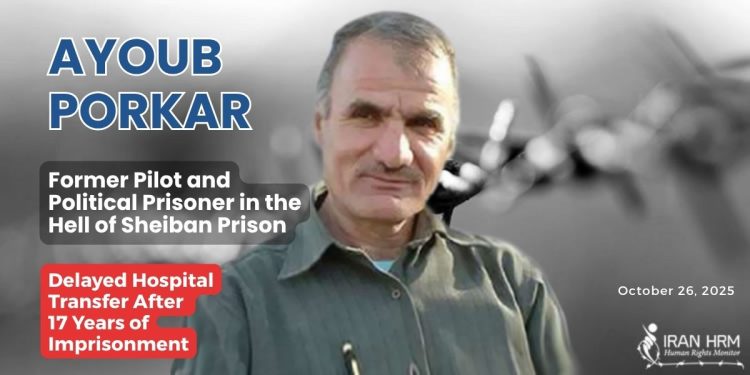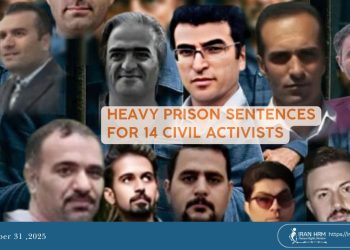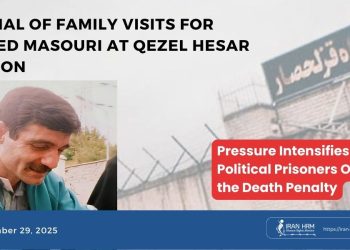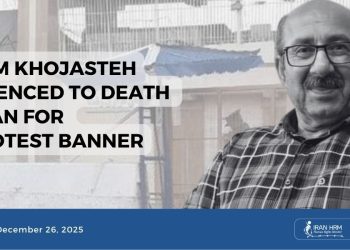Ayoub Porkar, one of Iran’s longest-held political prisoners and a former Air Force pilot, was transferred from Sheiban Prison in Ahvaz to a hospital on October 23, 2025, after suffering a severe abdominal hernia and chronic knee pain. Sources close to his family confirmed that the transfer occurred only after weeks of delay, during which his life was in danger due to the risk of hernia rupture. Human rights activists have warned that such deliberate medical neglect amounts to a form of prolonged torture widely practiced against political detainees in Iran.
Background and Biography
Born in 1955 in the village of Pirlouheh near Tabriz, Porkar served as a fighter pilot in the Iranian Air Force before being expelled from service for expressing opposition to the clerical regime. His family connections and alleged sympathies toward the People’s Mojahedin Organization of Iran (PMOI/MEK) brought him under surveillance by security forces. On January 3, 2009 (14 Dey 1387), agents of the Ministry of Intelligence arrested him in Tehran. In a closed-door trial held on November 28, 2009, Branch 26 of Tehran’s Revolutionary Court, presided over by Judge Mohammadreza Pour-Abbasi, sentenced him to death on the charge of moharebeh (“enmity against God”) through alleged collaboration with the PMOI. The sentence was later commuted to 20 years in prison by the Court of Appeals.
Seventeen Years in Prison Without a Single Day of Leave
Since his arrest, Porkar has spent more than 17 consecutive years in detention without furlough or temporary release. He has been repeatedly transferred among several prisons — from Evin Prison in Tehran to Behbahan Prison, then Karun, Shushtar, and finally Sheiban Prison in Ahvaz, where he has been held since February 2016. Each transfer further restricted his access to family and legal counsel. His relatives, residing in Tehran, rarely managed to visit him due to the long distance. Former inmates describe him as a man of integrity who has repeatedly refused to appear in forced televised confessions or express repentance.
Health Deterioration and Medical Neglect
Porkar suffers from multiple chronic illnesses, including severe knee osteoarthritis, advanced testicular varicocele (grade III), and a progressive abdominal hernia. These conditions, some resulting from torture during interrogations, have been aggravated by years of deliberate medical neglect. According to informed prison sources, he has long struggled to walk and endured excruciating pain, yet prison officials consistently denied him access to specialized care, offering only painkillers. The recent hospital transfer marks the first external medical treatment he has received in 17 years, carried out only after pressure from fellow inmates and persistent appeals from rights advocates.
Sheiban Prison: A Symbol of “White Torture” and Medical Deprivation
Located 12 kilometers from Ahvaz on the road to Masjed-Soleyman, Sheiban Prison—officially known as the Ahvaz Vocational Correctional Complex—is one of Iran’s most notorious detention centers. Built in 2015 with a declared capacity of 3,150 inmates, it now holds over 4,500 prisoners, including hundreds of political and conscience detainees. Severe overcrowding, contaminated water, rotten food, and the absence of basic sanitation make it a “silent torture chamber.” In recent months, multiple reports have documented mass food poisoning, hunger strikes, and secret executions of Arab political prisoners. In September 2025, over half of the inmates suffered from food poisoning caused by spoiled meat. On October 3, six Arab prisoners were secretly executed and buried without notifying their families. Ward 5, which houses most political prisoners including Porkar, is described as suffocating, unsanitary, and routinely denies access to medical treatment even for severe conditions.
Legal Analysis: Systematic Violations of International Human Rights Obligations
The case of Ayoub Porkar exemplifies the ruling regime in Iran’s ongoing breach of international human rights standards:
– Article 5 of the Universal Declaration of Human Rights: prohibits torture and cruel, inhuman, or degrading treatment. Denial of medical care to an elderly prisoner constitutes “slow death” torture.
– Article 25 of the UDHR: guarantees the right to adequate medical care.
– Article 10 of the International Covenant on Civil and Political Rights (ICCPR): requires humane treatment of all detainees.
– Nelson Mandela Rules: mandate immediate transfer of ill prisoners to specialized medical facilities.
The authorities’ persistent neglect of Porkar’s condition represents a systematic and deliberate policy of white torture against political prisoners.
International Reactions
In recent years, international human rights institutions have raised growing concern over the treatment of political prisoners in Iran’s Sheiban Prison. The National Council of Resistance of Iran (NCRI), in its 2024 statements, highlighted the case of Ayoub Porkar and several other long-term detainees, urging the UN High Commissioner for Human Rights and the UN Special Rapporteur on Iran to conduct fact-finding missions and secure the immediate release of ailing political prisoners. These appeals reflect the mounting alarm of the global human rights community over the inhumane conditions prevailing in Iran’s prisons.
Human and Social Dimensions
Among fellow inmates, Porkar is known for his modesty, composure, and unwavering moral principles. He took part in prison protests in 2019 and 2022 alongside other political detainees, consistently calling for dignity and humane treatment. Throughout his 17 years of imprisonment, he has endured psychological pressure and repeated threats to make televised confessions, yet has refused to comply. At the age of 70, frail but resolute, Ayoub Porkar remains a symbol of moral resistance inside Iran’s prisons.
Conclusion and Call to Action
The belated transfer of Ayoub Porkar to a hospital exposes a deeper humanitarian crisis within Iran’s prison system—one that systematically endangers the lives of political detainees. The international community must demand the immediate release of sick and elderly prisoners and take concrete action to halt medical torture in Iranian prisons. As Porkar enters his 18th year of unjust imprisonment, his voice stands for hundreds of others silenced behind bars—reminding the world that the struggle for dignity and justice continues.







